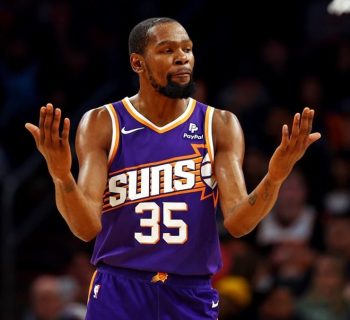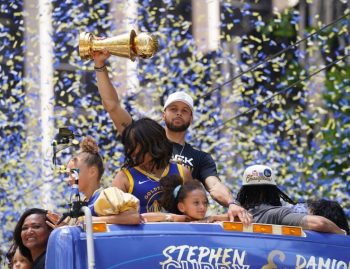NBA
NBA Sunday: Steve Kerr’s Warriors Rising

As Steve Kerr stood on the stage with flashing lights and eyeballs aplenty on him, he beamed.
The seat was hot, the questions were cold and the reception was lukewarm.
A five-year contract for a first-time head coach was almost unheard of, much less one to the tune of $25 million. What made matters even worse for Kerr, was that his predecessor, Mark Jackson, had helped lead the franchise to forgotten success.
He left big shoes to fill, despite being unceremoniously fired.
But Kerr will look at the examples set by Larry Brown in Detroit and Rick Carlisle in Dallas and know what he is attempting to do is quite possible.
In the NBA, especially over the course of the past 15 years, we have witnessed the head coach become increasingly disposable. As it currently stands, only four coaches in the entire league have been with their current team for at least five years: Gregg Popovich (San Antonio Spurs), Erik Spoelstra (Miami HEAT), Rick Carlisle (Dallas Mavericks) and Scott Brooks (Oklahoma City Thunder).
Since January 2012, a whopping 21 NBA teams have changed head coaches, and it was with that knowledge that Kerr took the helm of a team that many felt was on the cusp of greatness.
Guiding them now is his responsibility.
Today, six months after he stood in front of the assembled media in Oakland with a beaming smile, a giddy demeanor and a nicely tailored charcoal grey suit, his Golden State Warriors have fully captured the imaginations of the NBA’s viewing public.
In the early going, Klay Thompson appears to be worth the four-year, $70 million contract he was awarded and the Warriors seem to be fulfilling the promise that enamored Kerr in the first place.
The edict from Kerr has been simple: work harder on defense and share the ball more on offense. It is impossible to argue with the early results.
Regarded mostly as offensive weapons, Thompson and Stephen Curry have been, at least in the early going, pesky defenders. On the perimeter, the Warriors fight over screens and do their best to disrupt opposing ball handlers. Kerr has also committed to giving minutes to Andrew Bogut, Draymond Green, Andre Iguodala and Shaun Livingston— strong defenders in each of their own rights.
The early results have been amazing. The Warriors enter play on November 9 allowing just 92.4 points per game, which is third best in the league. That is about a full eight points less than they allowed last season (100.3).
On the offensive end, Kerr has been a proponent of more off-ball movement from his shooters, more backdoor cuts and more passing overall. As a result, an already potent offensive team has gotten even better. At 107.2 points per game, the Warriors are the top scoring team in the league, showing much more scoring prowess than they did last season when they scored 101.2 points per game.
Yes, it is early, but there is nothing wrong with reading early returns, especially in a day and age when we collectively expect expediency.
In Cleveland, after five games, the ridiculous idea of trading Kyrie Irving has been floated, so conversely, we should stop and collectively credit Kerr for leading his Warriors off to a good start.
They will go down as the final unbeaten team of the 2014-15 season, and if that is an omen of what Kerr is capable of as a head coach, we may see some history repeat itself.
Clearly, this is just the beginning, but if it all ends well, he may eventually find himself being mentioned along the likes of Brown and Carlisle—two coaching legends.
The man that helped install him in Oakland, Warriors general manager Bob Myers, may be looked upon as a prophet who made the correct decision under tremendous pressure. In that regard, he may be mentioned alongside both Joe Dumars and Mark Cuban, because once upon a time, both of those men made shocking decisions to remove successful head coaches.
And in the long run, they proved to be correct.
Ultimately, the decision to oust Jackson and install Kerr could go down as similarly stellar.
——
Way back in 1999, way before the Detroit Pistons became one of the dominant powerhouses in the Eastern Conference, Grant Hill had grown frustrated with the direction of the franchise.
With the ink still wet on his retirement papers, Joe Dumars began working in the front office of the Pistons and quickly ascended as the voice that late former owner Bill Davidson would trust with his franchise.
Quietly, from his office, Dumars made difficult decisions that included trading Hill, the team’s franchise player.
Dumars, the executive, quickly made a home for himself at the Palace at Auburn Hills, and so did Rick Carlisle.
Carlisle had spent three years on the bench of the Indiana Pacers as the understudy to Larry Bird. By Bird’s side, the Pacers pushed Michael Jordan’s 1998 Chicago Bulls to seven games and would eventually win the conference in 2000, falling short to the Los Angeles Lakers in the NBA Finals that year.
But when Bird decided to retire from the ranks of coaching, it was not Carlisle who Pacers president Donnie Walsh tapped to replace Bird—it was Isiah Thomas.
Dumars, seemingly aware of the potential that Carlisle had, pounced on him and made him the 27th head coach in franchise history.
Carlisle would sign a three-year deal with the Pistons and in his very first season, led a roster featuring Jerry Steakhouse and Clifford Robinson to an 18-win improvement. The 50-32 record helped Carlisle win the NBA’s Coach of the Year Award after his first season. Their season ended in the second round of the Eastern Conference playoffs, where they lost to the Boston Celtics.
The following year, in 2002, with new, younger faces, Carlisle again led the Pistons to 50 wins. And although the team advanced to the Eastern Conference Finals for the first time since 1991, the Pistons were swept by the New Jersey Nets.
Still, Carlisle seemed to be the correct choice for Dumars, helping to lead the franchise from the doldrums and winning the league’s Coach of the Year Award along the way.
Clearly, then, you could imagine Carlisle’s surprise when he got the phone call telling him that the Pistons were deciding to end his employment one year early. And clearly, you can imagine everyone else’s surprise when it was revealed that Larry Brown would be named Carlisle’s successor in Detroit.
At the time, the move was considered questionable at best and asinine at worst.
But by the time Brown’s tenure in Detroit ended, a different word was most associated with Dumar’s decision to install Brown: “Brilliant.”
Brown’s mantra of systematic defense and “playing the right way” caught on with his Pistons team that featured no standout superstar, only a well-oiled basketball playing machine. With the acquisition of Rasheed Wallace during the 2003-04 season, the team had its final piece and would eventually go on to pull off one of the biggest NBA Finals upsets in history, defeating the Los Angeles Lakers in the 2004 NBA Finals, 4-1.
Brown would lead the Pistons back to the NBA Finals the following season, before falling short to the San Antonio Spurs in a seventh and deciding game.
It is impossible to argue with results, and that is why history will ultimately forget the apparent raw deal that Carlisle received from Dumars, just like it has forgotten that the same thing happened to Avery Johnson in Dallas.
——
In 1997, Don Nelson took over as the head coach and general manager of the Dallas Mavericks and with Steve Nash, Michael Finley, Dirk Nowitzki and Mark Cuban eventually joining forces with him, he began the revival of the franchise.
After seven years with the franchise, as Nelson and Cuban began to butt heads, Avery Johnson was tapped as Nelson’s successor in Dallas. Johnson had played for Nelson for two years and had served as an apprentice under the coach before eventually being handed the reins of the team in 2005.
Under Johnson, the Mavericks had unprecedented success. In 2006, he led the Mavericks to the NBA Finals for the first time in franchise history. The next season, the Mavericks won a franchise-record 67 games.
In that 67-win season, however, the Mavericks became just the third number one seed to be ousted by a number eight seed in the playoffs. Ironically, it was the Don Nelson-coached Golden State Warriors who would defeat Johnson’s Mavericks in six games.
Perhaps even more ironic, though, was that after the Mavericks saw their 67-win season result in a first round exit, they followed it up with another first round exit the following season, this time, it was the New Orleans Hornets who did them in.
Cuban made the decision to replace Johnson on the bench. Like the aforementioned Carlisle, Johnson won the NBA Coach of the Year Award in his first season as the man in charge for the Mavericks (2006).
So yes, it was especially ironic that it was Carlisle who would replace Johnson in Dallas. And just like Larry Brown did with Carlisle’s team in Detroit, it was Carlisle who would eventually lead the Mavericks to pull off what was perhaps the biggest NBA Finals upset since Brown’s Pistons defeated the Lakers in 2004, when Dallas beat the Miami HEAT in seven games in the 2011 NBA Finals.
You’ve simply gotta love how history repeats itself.
——
By hiring Mark Jackson in Oakland, owner Joe Lacob took a chance on a former player who had no prior coaching experience. Although Jackson fell short of fulfilling his promise of qualifying for the playoffs in his first year on the job, the Warriors experienced appreciable growth with him in charge.
He helped to teach Monta Ellis a thing or two about what it meant to be a team player—gifts that Ellis has since used to help find success for the teams he has since played for.
He assisted some of his younger players—Charles Jenkins, David Lee, Brandon Rush and Dorell Wright—that putting team before all else was the true hallmark of a great and sustained NBA career.
He led the franchise to its first 50-win season since 1994.
And yes, he helped both Curry and Thompson develop into the players that they are today—a backcourt duo that many believe is the most gifted in the NBA.
Yet, in the end, all Jackson got for it was a pink slip and in his wake, he has left some lofty expectations that Kerr must now fight to reach.
Thus far, the returns have been good.
Fortunately for Kerr, there is a precedent for success in such a situation.
Unfortunately for him, he has no prior head coaching experience upon which he can rely to help steer his team through the rugged terrain that they will, no doubt, traverse.
Thus far, it does not seem to have been an issue for the Warriors.
Yes, the journey is long and the road will be topsy-turvy, but, I’m sure those were warnings that Brown and Carlisle got, as well.
In the end, in the NBA, the cream always rises to the top.
And if the early returns on Kerr’s debut are any indication of what is to come, in May 2015, one year after he sat in front of the media in Oakland and introduced himself, Kerr may again find himself in front of the flashing lights and eyeballs aplenty.
Only this time, instead of him discussing the potential of his Warriors team and the obstacles he will face as a head coach, he may be discussing how he conquered them.
Yes, for the Warriors, the long road is just beginning. But in Kerr, without question, the team has itself a capable conductor.













